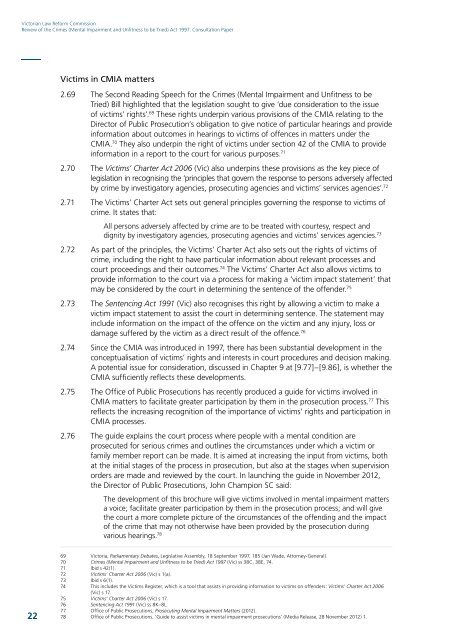Crimes Mental Impairment consultation paper.pdf - Victorian Law ...
Crimes Mental Impairment consultation paper.pdf - Victorian Law ...
Crimes Mental Impairment consultation paper.pdf - Victorian Law ...
Create successful ePaper yourself
Turn your PDF publications into a flip-book with our unique Google optimized e-Paper software.
<strong>Victorian</strong> <strong>Law</strong> Reform Commission<br />
Review of the <strong>Crimes</strong> (<strong>Mental</strong> <strong>Impairment</strong> and Unfitness to be Tried) Act 1997: Consultation Paper<br />
Victims in CMIA matters<br />
2.69 The Second Reading Speech for the <strong>Crimes</strong> (<strong>Mental</strong> <strong>Impairment</strong> and Unfitness to be<br />
Tried) Bill highlighted that the legislation sought to give ‘due consideration to the issue<br />
of victims’ rights’. 69 These rights underpin various provisions of the CMIA relating to the<br />
Director of Public Prosecution’s obligation to give notice of particular hearings and provide<br />
information about outcomes in hearings to victims of offences in matters under the<br />
CMIA. 70 They also underpin the right of victims under section 42 of the CMIA to provide<br />
information in a report to the court for various purposes. 71<br />
2.70 The Victims’ Charter Act 2006 (Vic) also underpins these provisions as the key piece of<br />
legislation in recognising the ‘principles that govern the response to persons adversely affected<br />
by crime by investigatory agencies, prosecuting agencies and victims’ services agencies’. 72<br />
2.71 The Victims’ Charter Act sets out general principles governing the response to victims of<br />
crime. It states that:<br />
All persons adversely affected by crime are to be treated with courtesy, respect and<br />
dignity by investigatory agencies, prosecuting agencies and victims’ services agencies. 73<br />
2.72 As part of the principles, the Victims’ Charter Act also sets out the rights of victims of<br />
crime, including the right to have particular information about relevant processes and<br />
court proceedings and their outcomes. 74 The Victims’ Charter Act also allows victims to<br />
provide information to the court via a process for making a ‘victim impact statement’ that<br />
may be considered by the court in determining the sentence of the offender. 75<br />
2.73 The Sentencing Act 1991 (Vic) also recognises this right by allowing a victim to make a<br />
victim impact statement to assist the court in determining sentence. The statement may<br />
include information on the impact of the offence on the victim and any injury, loss or<br />
damage suffered by the victim as a direct result of the offence. 76<br />
2.74 Since the CMIA was introduced in 1997, there has been substantial development in the<br />
conceptualisation of victims’ rights and interests in court procedures and decision making.<br />
A potential issue for consideration, discussed in Chapter 9 at [9.77]–[9.86], is whether the<br />
CMIA sufficiently reflects these developments.<br />
2.75 The Office of Public Prosecutions has recently produced a guide for victims involved in<br />
CMIA matters to facilitate greater participation by them in the prosecution process. 77 This<br />
reflects the increasing recognition of the importance of victims’ rights and participation in<br />
CMIA processes.<br />
2.76 The guide explains the court process where people with a mental condition are<br />
prosecuted for serious crimes and outlines the circumstances under which a victim or<br />
family member report can be made. It is aimed at increasing the input from victims, both<br />
at the initial stages of the process in prosecution, but also at the stages when supervision<br />
orders are made and reviewed by the court. In launching the guide in November 2012,<br />
the Director of Public Prosecutions, John Champion SC said:<br />
The development of this brochure will give victims involved in mental impairment matters<br />
a voice; facilitate greater participation by them in the prosecution process; and will give<br />
the court a more complete picture of the circumstances of the offending and the impact<br />
of the crime that may not otherwise have been provided by the prosecution during<br />
various hearings. 78<br />
22<br />
69 Victoria, Parliamentary Debates, Legislative Assembly, 18 September 1997, 185 (Jan Wade, Attorney-General).<br />
70 <strong>Crimes</strong> (<strong>Mental</strong> <strong>Impairment</strong> and Unfitness to be Tried) Act 1997 (Vic) ss 38C, 38E, 74.<br />
71 Ibid s 42(1).<br />
72 Victims’ Charter Act 2006 (Vic) s 1(a).<br />
73 Ibid s 6(1).<br />
74 This includes the Victims Register, which is a tool that assists in providing information to victims on offenders: Victims’ Charter Act 2006<br />
(Vic) s 17.<br />
75 Victims’ Charter Act 2006 (Vic) s 17.<br />
76 Sentencing Act 1991 (Vic) ss 8K–8L.<br />
77 Office of Public Prosecutions, Prosecuting <strong>Mental</strong> <strong>Impairment</strong> Matters (2012).<br />
78 Office of Public Prosecutions, ‘Guide to assist victims in mental impairment prosecutions’ (Media Release, 28 November 2012) 1.

















